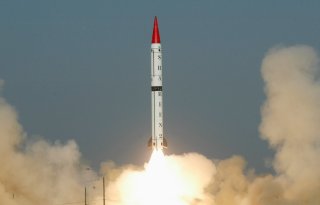Pakistan Could Be Headed Toward Disaster in 2024
Pakistan badly needs liberalization reforms, but they are politically risky.
In 2023, Pakistan was convulsed by three crises — economic, political and security. They originated in 2021 and 2022 but became more serious, forcing the country to pay the price of many years of problematic public policies that have been repeated rather than rectified.
In 2023, Pakistan experienced record inflation. Foreign exchange reserves fell to their lowest level in nearly a decade. External debt servicing was the highest ever. Over the 2022–2023 fiscal year the economy fell by US$33.4 billion and per capita income declined by 11 percent — also new records. Pakistan came perilously close to a default.
Disaster was averted in July after Islamabad finalized an International Monetary Fund (IMF) loan. But hardships continued for the general public, especially with IMF-mandated austerity policies further increasing inflation. Economic stress hit not only the poor. Government data shows that a whopping 900,000 skilled workers departed Pakistan in 2023, including doctors, paramedics and accountants.
The severe economic stress can be blamed in part on a government that failed to respond with sufficient urgency. It can also be attributed to external factors, like pandemic-induced global supply chain shocks and the war in Ukraine, which sent global commodity costs soaring.
For years, Islamabad’s trade policy has prioritized textile exports (that struggle to compete globally) and expensive fuel imports. Little has been done to address a woefully low tax base, debt-ridden public companies, and an inefficient agricultural sector. Pakistani officials, business leaders, and the military have consistently refused to pursue structural reforms that would bring the country more long-term economic stability.
It was also a year of political tumult and, at times, violence. A nasty confrontation between former prime minister Imran Khan and the army leadership carried over from 2022, when Khan was ousted in a controversial no-confidence vote that he accused then-Army chief Qamar Javed Bajwa of helping orchestrate.
Asim Munir succeeded Bajwa in November 2022 as army chief. Khan could have used that transition to bury the hatchet with the military and focus on preparing for elections. But Khan, who accused the military of an assassination attempt in November 2022, doubled down on his criticism of the military.
Khan and his party, Pakistan Tehreek-e-Insaf (PTI), faced major crackdowns in 2023. On 9 May, Khan was arrested, prompting protestors to attack several military facilities.
The Supreme Court ordered his release, but crackdowns on the opposition intensified. In August 2023, Khan was arrested again and jailed. With so many PTI leaders and supporters now in jail — nearly 10,000, according to the party — public responses were more subdued. Khan was convicted on multiple charges in January 2024, all of which he and his supporters reject as politically motivated, and sentenced to a total of 24 years imprisonment.
The year ended with the military on the front foot. Not only was Khan behind bars, but nearly his entire party — arguably Pakistan’s most popular — was sidelined. A pliant caretaker administration, which succeeded the government in August 2023, was in power, and elections were delayed to February 2024.
The political crisis is partly attributable to another age-old reality in Pakistan — the military’s heavy influence over politics. Top civilian leaders often cultivate close ties with the military to facilitate their rise to power, only to fall out with the Army leadership once in power. This happened to Khan. It had also happened to his nemesis, former prime minister Nawaz Sharif, multiple times. Sharif returned to Pakistan in October 2023 after four years in self-exile abroad. He’s now on good terms with the military and may become Pakistan’s next prime minister.
Throughout 2023, Pakistan suffered from an increase in terrorism that began after the 2021 Taliban takeover in neighboring Afghanistan. Terrorist attacks surged by 70 percent between 2022 and 2023. The Afghanistan-based Pakistani Taliban (TTP) perpetrated most of the attacks. Islamabad failed to convince the Taliban, which is closely allied with the TTP, to curb the group.
Pakistan sponsored the Taliban when it was waging its insurgency in Afghanistan. But with the war over, the Taliban no longer needs Pakistani patronage, prompting it to shrug off its former benefactor’s pleas for help. In November 2023, Islamabad began expelling hundreds of thousands of Afghan refugees, likely a last-ditch effort to pressure the Taliban into curbing the TTP. It did not work, but it did provoke one of the world’s most overlooked humanitarian crises of 2023.
In 2024, some of these trends continue. The military retains its deep footprint in politics. PTI’s continued struggles during the initial days of 2024 — including the rejection of hundreds of their electoral candidates’ nomination papers — suggest ongoing military influence on the imminent elections. And with attempts to curb the TTP having failed, there is likely to be growing pressure on Pakistan’s military to conduct cross-border counterterrorism operations.
There may be a silver lining for economic policy — but with a catch. Pakistan badly needs liberalization reforms, but they are politically risky. Pakistan’s current caretaker government is apolitical. It is the kind of administration that could undertake reforms — and already there are indications that it is working to start privatizing debt-ridden public corporations.
This could deliver major economic benefits, but could also damage Pakistan’s democracy and possibly spark social unrest given strong public support for elections.
But it appears the caretaker government’s days are numbered. Elections are scheduled for 8 February. And with Pakistani politics supercharged and hyperpolarised, the parties that do not win will likely reject the election result — setting the stage for a new phase of political instability, and shrinking the space for politically painful but economically necessary structural reforms.
Michael Kugelman is Director of the South Asia Institute at the Wilson Center.
This article was first published by the East Asia Forum.

